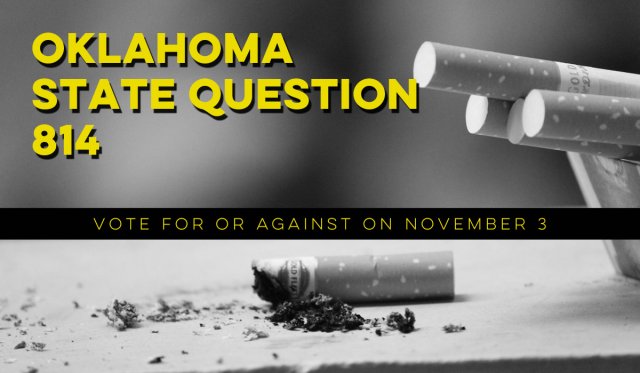
On Nov. 3, voters will consider State Question 814’s proposal to amend the Oklahoma Constitution and change how future funds received annually from a 1998 tobacco lawsuit settlement will be distributed. Approval of SQ 814 would send less money to the corpus of the Tobacco Settlement Endowment Trust and more money to legislative appropriations for Oklahoma’s Medicaid programs.
The 1998 Master Settlement Agreement (MSA) was reached in November 1998 between the state attorney generals of 46 states, five U.S. territories, the District of Columbia and the four largest cigarette manufacturers in America regarding the advertising and marketing of cigarettes, which some believed targeted youth.
Studies between 1976 and 1993 found that smoking accounted for between 6 percent and 8 percent of U.S. health care costs, amounting to more than $50 billion in 1993.
To recover costs, states sued the nation’s largest cigarette manufacturers, who agreed to perpetual annual payments to the states. In Fiscal Year 2019, the MSA paid $69,766,822 to Oklahoma, according to TSET’s FY19 annual report.
Currently, 75 percent of funds the state gets from the agreement go to TSET, which was created in 2000 to fund tobacco cessation efforts, health-related education, research and other programs.
The remaining 25 percent is designated for appropriation by the Legislature, and state law currently specifies the Attorney General’s Office gets 6.25 percent of the funds, which are earmarked for enforcing the MSA.
If approved, SQ 814 would switch the allotments so that 25 percent of newly received funds would go to TSET, and 75 percent would be provided to the Legislature for appropriation. SQ 814 would also set a new mandate for the use of the legislative funding, saying it “shall be appropriated and expended to draw down federal matching funds for the Medicaid program.”
That requirement could be timely considering a separate state question passed by voters in June. Owing to State Question 802‘s approval, Medicaid health coverage will be extended to all adult Oklahomans under age 65 who make less than 133 percent of the federal property level. The federal government will pay for 90 percent of the cost of this “Medicaid expansion,” which takes effect in July, but the state is responsible for the remaining 10 percent.
That means the Legislature has to come up with between $150 million and $160 million to pay its portion, according to Rep. Marcus McEntire (R-Duncan). Passing SQ 814, he said, would provide $50 million of that money.
“The budget this year is going to be really difficult with lower tax revenues,” McEntire said. “We’ve got to come up with the money to pay for Medicaid expansion. We are constitutionally mandated to do that.”
McEntire said increasing the amount the Legislature gets from annual MSA payments lessens any likelihood of raising taxes on citizens to pay for Medicaid expansion.
But some argue the TSET arrangement should be left alone.
Oklahoma government relations director for the American Heart Association Sarah Rivin said SQ 814 would divert MSA money from its original purpose, since TSET is about preventative programming and Medicaid expansion is about treating people with chronic disease and people who are already sick.
“As a health care organization in Oklahoma, we are very supportive of the work that TSET does,” Rivin said. “Particularly their work to combat tobacco use and obesity across our state. We strongly oppose any effort to take money from TSET.”
Rivin said the American Heart Association (AHA) has strongly supported Medicaid expansion and supported SQ 802.
“We just believe that taking (new) money from TSET isn’t the way to do it,” Rivin said.
As of June 30, TSET’s corpus (or principal endowment) was worth $1.3 billion, TSET director of public information and outreach Thomas Larson said.
TSET’s programs are paid for with earnings from investments of that money. The trust funds a variety of community and school grants, and it also funds the Oklahoma Tobacco Helpline. TSET spends millions of dollars on advertising to promote the helpline, discourage tobacco use and discourage the consumption of soft drinks, a marketing campaign that some have criticized as being off-topic for TSET.
“If State Question 814 passes, that would mean less money going into the TSET endowment every year,” Larson said. “What that’s going to do it the endowment is it’s not going to grow as quickly, which may impact TSET’s ability to start new programs or expand existing programs down the road.”
McEntire acknowledged that SQ 814 would keep the TSET endowment from growing as quickly.
“Is it going to impact what TSET does? Yeah, it will. But the voters have to decide if the trade off for paying for [Medicaid] expansion through this MSA money that comes in every year is worth it,” McEntire said. “Considering the $50 million we’re not going to have otherwise, and we don’t know where to get it.”
If SQ 814 fails Nov. 3, McEntire said the Legislature will simply go back to the drawing board and find the money from somewhere else, but he said it “has to come from somewhere”
“I think the real decision for voters is — is the TSET corpus large enough?” McEntire said. “Is that enough to not impact TSET’s mission?”





















